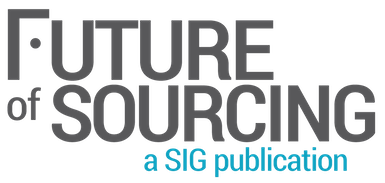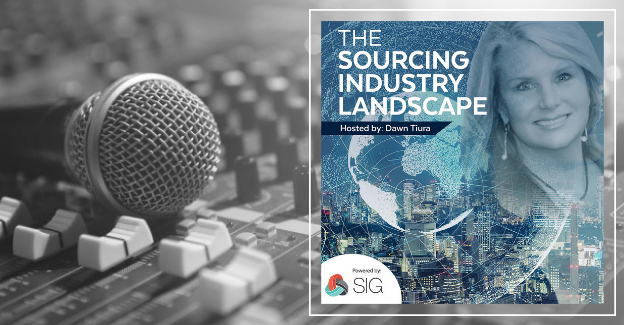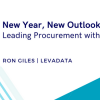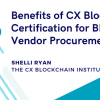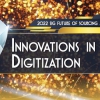In this episode of the Sourcing Industry Landscape, Dawn Tiura interviews Karen Gonzalez. Karen Gonzalez is the Chief Sales Officer at Guidant Global. Her career in staffing began with an unexpected start in recruiting 22 years ago, and her passion for acting as a problem solver for her clients has propelled her into her CSO role today.
Dawn Tiura: Folks, I want to welcome you back to the podcast series and here with me in the studio today is Karen Gonzales. Karen is the Chief Sales Officer at Guidant Global. Karen, thank you for joining me.
Karen Gonzalez: Thank you for having me.
Dawn Tiura: Now, I have to tell people Karen has perseverance. We have tried to do this podcast now for three months, I believe. If nothing else, I know you've got perseverance and I know somehow you're going to make it work, so I'm so excited to finally welcome you to the series.
Karen Gonzalez: Well, thank you so much. I would say that my perseverance is better than my technology skills.
Dawn Tiura: That's okay. Karen, you've had a really interesting journey, but could you maybe start with who is Guidant Global? Tell us a little bit about who it is you work for that might help frame some of your career.
Karen Gonzalez: Absolutely. Guidant Global is a brand that launched last year, and basically it was a merging of Bartech in North America and Guidant in the UK, and both Guidant and Bartech fall underneath the Impellam umbrella. Impellam is our holding company, parent company and they're based in the UK and really we wanted to bring these two brands together with our mission being that we want to transform and challenge kind of the quick fix in personal rushed revenue approach, which we feel prevails across the MSP market today. We wanted to really find a different way and a better way to deliver the solution. We've got some long held values and guiding principles.
Karen Gonzalez: We want to make sure we're challenging the status quo that we have and offer global perspective, that we are agile and nimble, that we're inventive and that we work collaboratively with our clients, with our internal stakeholders, etc., to just offer a better experience overall.
Dawn Tiura: Obviously, the staffing space, but can you describe for our audience what an MSP actually is?
Karen Gonzalez: Sure. An MSP is a managed service provider—and really, I think of us being in kind of that workforce solution space. We work with other staffing providers and we basically manage the relationship with those suppliers for different organizations. Our primary focus is, I would say, probably the Fortune 500, Fortune 1000 organizations, so they may have 50 suppliers that currently service them today. We manage that supply base as well as offering solutions to mitigate risk, provide transparency into their data and who is servicing them. We provide metrics around delivery and how those staffing suppliers are performing. They really outsource that whole function to us as the MSP.
Dawn Tiura: You bring technology to the table as well, correct?
Karen Gonzalez: Our organization is what we would call technology agnostic. We do not have our own proprietary VMS, or vendor management solution. We partner with other technology companies such as Beeline, Fieldglass, Kupa, Finley, to bring kind of the best in class technology to the table and our focus is really around providing the best service. We made that decision back in 1998 when we first started our MSP practice. At that time, we saw a lot of bundling of solutions, meaning that the same company offered MSP and VMS. What we've seen since then is kind of an uncoupling and companies have gone one direction or the other and we're really proud of the fact that that's been our direction all along.
Dawn Tiura: That's great. I didn't know that we had become a trend. I know when it was Bartech, and now Guidant Global, people describe you as having like a concierge type service, that you're more than just somebody who manages it. You must have a unique culture there.
Karen Gonzalez: Absolutely. I think this goes back to when we thought about bringing the brands together what did we want the market to see and when they hear the name, what do we want them to think. It really is about doing things in a better way. I talked a little bit about in the beginning that kind of rush to revenue approach. I think what I'm really proud of, and one of the reasons I joined the organization is that when I first met with David Barfield and we were talking about what's important as an organization from his standpoint, not once did he say it was most important to earn as much money as possible and to be the biggest MSP out there.
Karen Gonzalez: It was all about doing things the right way and having integrity and making sure that we're developing relationships. His theory back then and still continues today is that: if you're doing the right things by your stakeholders, internal and external, that the profits are going to come. It was really important for me to join an organization that was not profit first, but was people first.
Dawn Tiura: I love that. That's a great story. Tell me a little bit about yourself then because when I've looked at your career on LinkedIn, you've been in the staffing industry for most of your career, haven't you?
Karen Gonzalez: Pretty much all my career. Obviously, I had some jobs my teenage days and early college days. But, yes, I've been doing this for a long time and it certainly is not something that I planned to do. I actually applied at a staffing company and they said, have you ever thought about recruiting? I was like, I really don't even know what that is, but all I know is from the process that I've gone through, I know what that looks like. But, I just needed a job, so I'm like, sure, tell me what I need to do. That's kind of how it started. I started as a recruiter on the desk recruiting and then I've worked my way up through various roles.
Dawn Tiura: Wow. You've worked your way all the way up to chief sales officer for a great company, so you've done a great job with it. But tell me, why did you stay? Do you love the industry? What attracts you to it?
Karen Gonzalez: I definitely have a passion for this industry and I think it's a unique industry. I joke that my family still doesn't really understand exactly what I do. For me, I love the interactions, certainly when I was on the recruiting side helping people find work that was meaningful for them. My interactions with the clients and certainly in my role today, my favorite part of my role is kind of the early days with those prospects and clients where I'm really helping solve problems and providing solutions to their pain points and working through those and creating a better way for them, if you will, and helping them meet their internal objectives. For me, that's my favorite part of the job and continues to be where I like to spend my time.
Dawn Tiura: That's neat. What did you study in your degree?
Karen Gonzalez: Business and HR.
Dawn Tiura: You had a little bit of the HR people side to you as well?
Karen Gonzalez: I definitely did, and that certainly helped me in my role. I feel like either of those areas are things that you can carry into just about any role that you might go into either on the staffing side or even in other businesses, other types of business. It has served me well.
Dawn Tiura: That's neat. Tell me then, so you're solving people's problems and in the beginning you were putting the right people in the right positions. How do you see that this world is changing right now around staffing?
Karen Gonzalez: I mean certainly you think about the digital space and how kind of the traditional staff way of doing things. Traditional staffing has evolved and there are a lot of new digital players in the market. You have your online recruiting, you have companies that are focused on talent pools. I think what we're going to continue to see is we're going to continue to see what we think of as traditional staffing organizations have more of a digital platform to be able to play with kind of the niche providers that are doing kind of the crowd recruiting, online recruiting, etc. I think we're going to be seeing kind of a blending of those worlds, if you will.
Karen Gonzalez: As an MSP determining how do we—how do we continue to partner with our traditional suppliers, but also incorporate some of the new digital platforms into our supply base. That's kind of where we are today.
Dawn Tiura: I'm asking a very naive question, but the rise of the MSP and the VMSs, is that because we have so many more people who choose to be contingent workforce versus employees now and because that trend is still increasing?
Karen Gonzalez: I definitely think that that's a part of it. When I think back kind of when MSPs first came into the market, it really was a result of you think about people in procurement and HR that we're spending a lot of their time managing suppliers. As an MSP, we take that off their hands so they can focus on kind of, if you will, their "real jobs" or the jobs that they were hired to do, and it's a way for them to outsource it. I think that's... And we've seen a continuous trajectory of growth when it comes to contingent labor and now you've got the gig economy that's factoring into that. I think that's continued to spur the growth of MSPs and VMSs.
Dawn Tiura: Yeah. Because back in my consulting days, and the last time I was on a consulting project just about 19, was it 2006; I took over SIG in 2007. I was at... It's not that long ago, but it seems eons ago. I remember being at a Fortune 100 company and the VP of HR was asked by the CEO, how many people does it take to run my company. He had a real glib response, like 54,000. He said, no, no, I didn't ask how many people or how many employees we had, how many people does it take to run my company? Well, this guy came storming over to procurement and said, who's working here? Who are all the contractors? What's going on? It was the first time that us as a sourcing person, we had to put together hunt and search for the people that were on SOW, is a statement of work.
Dawn Tiura: People that were piecemeal and time and materials. It turned out that number was almost double the 54,000 employees; they were shocked by it. But, we had partial people and halftime people and FTE equivalence. I was shocked that you could have so many people working for you, that you didn't have your arms around it, and you're a Fortune 100 company. When I hear of a MSP solution and somebody who's tying all these pieces together, I think thank God we need this in our industry so badly to reduce the risk because they didn't even know who, they couldn't identify all their contractors and everyone else. It was just shocking to me. I'm sure back in the early days you probably ran into some of those stories.
Karen Gonzalez: We still do. I mean there are still a lot of companies that what we would call first-generation, so they've never had an MSP, but they're starting to realize how much risk there is by not having transparency into who has access into their systems, who has access to their facilities. They have no control regarding costs because you've got hiring managers that are just like, I need to get the work done. They don't care what it costs. They just need the people to do the work to get the product out. As an MSP, we are looking at all of those different things and really managing all of that for them and also providing the analytics and the data to enable them to have that visibility and transparency.
Karen Gonzalez: Not just that, but really then just bringing the thought leadership to the table to say, okay, here's what this looks like. Here's our recommendation based on your current population. Here's some risks we've identified, here's some trends that we're seeing, and here's what we need to do going forward to reduce your risk and make this a best in class program. That's really our role, and really we see ourselves as consultants, because we're taking that and recommending a solution and then continuing to build on that throughout the duration of the relationship.
Dawn Tiura: That's amazing, and it's so great that you get it, but I'm shocked that there are companies. I shouldn't be. There are people that are companies that I find out haven't started strategic sourcing yet. My God.
Karen Gonzalez: Yeah.
Dawn Tiura: To think that they haven't realized the amount of risk they have with all these people and all the breaches and everything else is just shocking to me. Once again, I am so glad that you guys are inserted into these companies and helping them with this because it's such an important risk aspect to every organization out there.
Karen Gonzalez: We're continuing to see that ratio of whether they're contingent workers, SOW. Contingent is kind of that all-encompassing, non-FTE workforce, if you will. We're continuing to see the percentage or the ratio of contingent versus full-time continue to rise. You've got some companies that are kind of leading the charge there, but they have recognized that it makes sense to incorporate these types of workers into their overall workforce strategy.
Dawn Tiura: Another naive question. All the co-employment issues that you hear about, which is what started the conversation dozens of years ago… Do you help protect about the co-employment by managing this workforce for them?
Karen Gonzalez: We manage the suppliers who find the worker. Yes, we certainly help them around guidelines. For example, we might work with a client who has no tenure limits to say, okay, let's work together to determine what those tenure limits should be. That said, we also recognize that co-employment is not just about tenure limits. It's about who's directing those workers. We work with our supply base to make sure that they are doing what they need to do from a co-employment perspective and then looking at the organizations that we're working with and helping them identify where there might be risks in terms of co-employment and then making recommendations based upon that.
Dawn Tiura: I see. My background is I'm a CPA and we used to talk about co-employment issues with our clients all the time and the risk of it; I'm sure glad I'm not doing it nowadays with so many contingent workers. It just scares me on so many avenues. Now in the news, you hear all this contingent workforce who says we're being treated like second class citizens and we want the same perks and benefits that the employees get. It's like—you can't. You're not an employee, and you think the demands are going to get even stronger from the contingent workforce when they become a much larger percentage of your total employment.
Karen Gonzalez: Certainly. I have seen a huge swing. To your point, back when I first started, it wasn't as much of an issue. Then, it became a huge issue because we saw some lawsuits that created a lot of buzz around co-employment. Then, there was this extreme stance of we're not going to include contingent workers in anything because people were just running scared. Now, we've seen this rise of ‘talent first’, a talent first approach, and employee engagement and how important that is to organizations and their branding. I have now seen this kind of swing back to how do we find the balance of increasing the employee engagement, whether they're a gig worker or a full-time worker or some type of contingent worker versus a full-time employee.
Karen Gonzalez: Because they're recognizing, especially with social media, that their brand is impacted as much by full-time workers as it is any type of contingent worker.
Dawn Tiura: It sure is.
Karen Gonzalez: How do we balance that? I think we're seeing a larger uptick in terms of employee engagement, and what can they do, and how can we or other staffing suppliers help them with that engagement.
Dawn Tiura: Yeah. it's exciting time, isn't it?
Karen Gonzalez: Absolutely.
Dawn Tiura: Through your journey, and you've seen a lot of the changes as I have, what would you recommend to a new sourcing person starting out, and they want to get into workforce management or talent management? What kind of traits would you be looking for and tell them they need to develop?
Karen Gonzalez: I think despite what maybe some procurement folks would say, I think that anybody who's looking to go into procurement needs to understand that it is still a very people centric position. I think everybody thinks of procurement and sourcing as very focused on cost and savings and that certainly is a big part of their role. They need to be financially savvy. They need to understand forecasting. They need to have great analytical skills, obviously good negotiation skills. But, I think really at the top of my list would be they need to be an influencer and be able to build relationships with internal and external stakeholders; they really need to have a strong ability to drive change.
Karen Gonzalez: Because when I think of where we are today versus even two or three years ago, when you think of technology and all the changes that are taking place just because of the technology that's available to us, the amount of change that's taking place is exponential. That ability to drive change, I just don't think things stay static for very long, and they've got to have the ability to work with their internal stakeholders to get them on board, to drive the change that they need to stay competitive and do the things that they need to achieve their organizational objectives. To me, that's probably at the top of the list.
Karen Gonzalez: I think all of the other things kind of fall below that, but certainly people skills, negotiation skills and the ability to flex and be nimble and drive that change throughout the organization is going to be key.
Dawn Tiura: Yeah. I think you're absolutely right. Looking back on your career, obviously you've done quite well for yourself, what do you wish you had, could tell your younger self? What have you learned that would have been like if I just knew this 20 years ago, it would have been so beautiful?
Karen Gonzalez: There's a few things, and some of these things I have reiterated to the teams that I have managed in the past. One, I feel like we're typically our own worst enemies, and we typically limit ourselves more than other people limit us. Just remember that typically you can do more than you actually think you can, so that's number one. I think the second thing, especially in this industry and being in the role that I'm in, is leave your ego at the door. Don't be a right fighter. Whether you're talking to a client, whether it's somebody internal, start with kind of what your objective is. Keep the end in mind. What are you trying to accomplish, and does this conversation help me achieve that goal?
Karen Gonzalez: It's not about being right, it's about getting to an end result that makes sense and that is good for both parties. I think that's another one. For me, I'm a very curious person, and I think it helps if you just remain curious. Remain curious about who you're working with, the clients that you have, the prospects that you have. Be curious about what's happening in the market. Seek to learn as much as you can at all times, and know your worth. I think that's the last thing that I would say is certainly when I look back at my younger self, I definitely did not know and understand what that meant, or know what that meant.
Karen Gonzalez: I think looking back when you're in a service type of role, it's very easy to just say they're the client, I'm in a service role. I just need to do whatever they want me to do. I think clients will respect you so much more if they see you as an expert. If you bring something to the table that maybe they haven't thought about before and if they challenge you, know that you have something fantastic to offer, that you are doing what you do to earn a living, and that you have to do right by the company that you're working with. Don't give away your business, know your worth as an individual and in terms of what you're offering to that particular client.
Dawn Tiura: Yeah. That's really, really good advice. It's been so nice having, spending some time with you, but we are going to have to cut it short. I try and keep these consumable in the car ride or you're doing a quick workout, so thank you, Karen. Thank you for your perseverance. Thank you for making it to this podcast and I'd love to follow up with you at a later date and just talk more about the industry because you gave some great insights that I think are just invaluable to our listeners.
Karen Gonzalez: Well thank you so much, Dawn. It's been a pleasure and I appreciate your time today.
Dawn Tiura: Well, I appreciate having the time to get to know you. Thank you so much. Folks, once again, I am saying goodbye now to Karen Gonzalez, who is the Chief Sales Officer at Guidant Global. Link in with her, get to know her, she's a great human being, a lot of fun, super sweet and successful. What a combination. With that, Karen, thank you and everyone else have a great day and I hope that you'll join us again on our podcast real soon.

